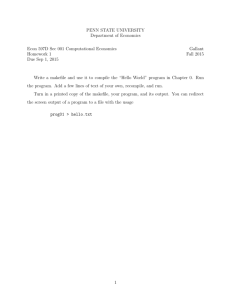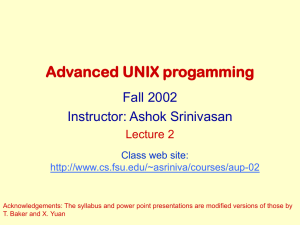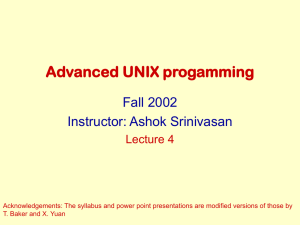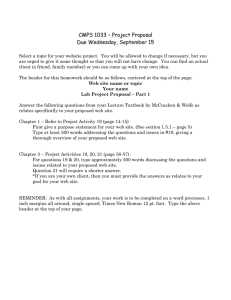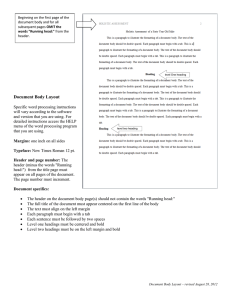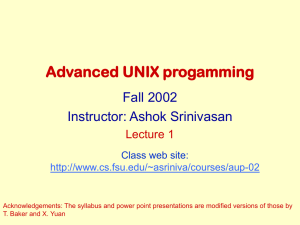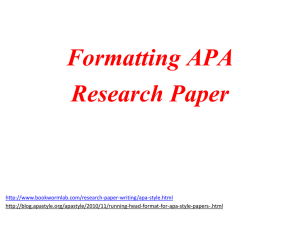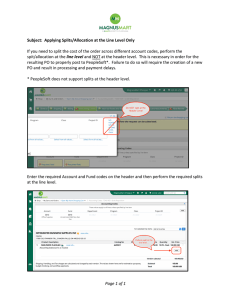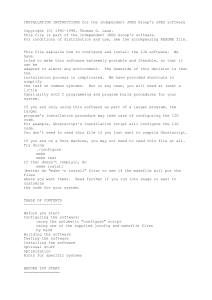Advanced UNIX progamming Fall 2002 Instructor: Ashok Srinivasan Lecture 3
advertisement
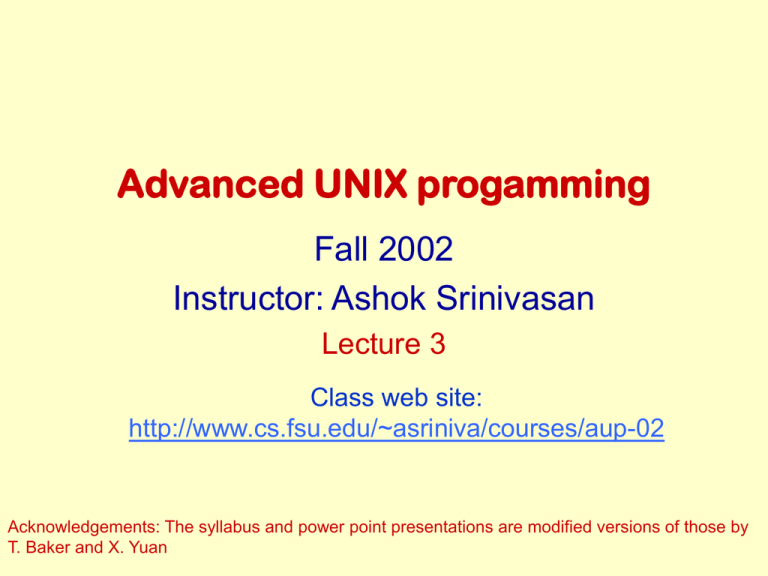
Advanced UNIX progamming Fall 2002 Instructor: Ashok Srinivasan Lecture 3 Class web site: http://www.cs.fsu.edu/~asriniva/courses/aup-02 Acknowledgements: The syllabus and power point presentations are modified versions of those by T. Baker and X. Yuan Announcements • Assignment 1 announced – Due Sep 13, 2002 Week 1 Topics • Course outline and policies • UNIX programming environment – Editors – C compilers and debuggers – Makefiles • Review some features of C – Header files – Command line arguments – Utilities • Review some UNIX system calls – system, etc UNIX programming environment • • • • Editors C compilers Debugger Makefiles – make • run <command line arguments> to run the program Make • make [-f makefile][option] target – A tool to update files derived from other files – The default files for make are ./makefile, ./Makefile, ./s.makefile – Use the –f option to specify some other file • make –f makefile1 – The makefile has three components • Macros: define constants • Target rules: Specify how targets are made • Inference rules: Specify how targets can be made, implicitly. make will first check if a target rule applies, before using inference rules. make ... continued • Macros: • String1 = string2. – Example CC=gcc CFLAG=-Wall –ansi –pedantic • Target rules: • Target : [prerequisite…] • <tab> command • <tab> command – Example a.out : myprog1.c myprog2.c myprog3.c $(CC) $(CFLAG) myprog1.c myprog2.c myprog3.c make ... continued • Inference rules • • • • Target: <tab> command <tab> command Target must be of the form .s1 or .s1.s2 where .s1 and .s2 must be prerequisites of the .SUFFIXES special target. – .s1.s2 make *.s2 from *.s1 – .s1 make * from *.s1 • Example: .c: $(CC) –o $@ $< .c.o: $(CC) –c $< makefile examples • See the example makefiles – makefile, makefile1, makefile2 • makefile1 will recompile only the modified files, instead of everything • makefile2 has inference rules • www.cs.fsu.edu/cgi-bin/man.cgi can be used to find more information Review some features of C • • • • Header files Macros Command line arguments Utilities Header files • Usually define interfaces between separately compiled modules • May contain macro definitions, preprocessor directives, declarations of types, and function prototypes • Should not contain variable definitions or executable code Some header file errors • Improper header file use can cause problems – Try compiling example2.c – Including a header file multiple times may cause redefinition errors – Why does including stdio.h twice not cause any problem? • Look at /usr/include/stdio.h Conditional Code in Headers • Preprocessor directives are used to prevent the body of a header file from being used multiple times. #ifndef MYHEADER #define MYHEADER /* the body of the header file */ #endif Macros with and without Parameters • #define MAX_LENGTH 256 – ... for (i = 0; i < MAX_LENGTH; i++) ... • Macros can have parameters – #define max(a,b) (a > b) ? a : b • What is wrong with the following? – #define sum(a, b) a + b – #define product(a, b) a*b – See example3.c, example3b.c, example3c.c, and example3d.c Some useful functions • #include <stdio.h> • int sprintf(char *s, const char *format, ...); • int sscanf(const char *s, const char *format, ...); • How would these be used to get all the fields from the output of the shell command ps? – See example4.c. Some Unix System Calls • You may use these in your first assignement – system – mkstemp system #include <stdlib.h> int system(const char *string); – Works as if string is typed into the shell at a terminal – Returns the exit status (see man page for waitpid) – Usually -1 is returned if there is an error mkstemp #include <stdlib.h> int mkstemp(char *template) – template should end in XXXXXX – It replaces XXXXXX with unique file name, and returns an open file descriptor for a file available for reading and writing
